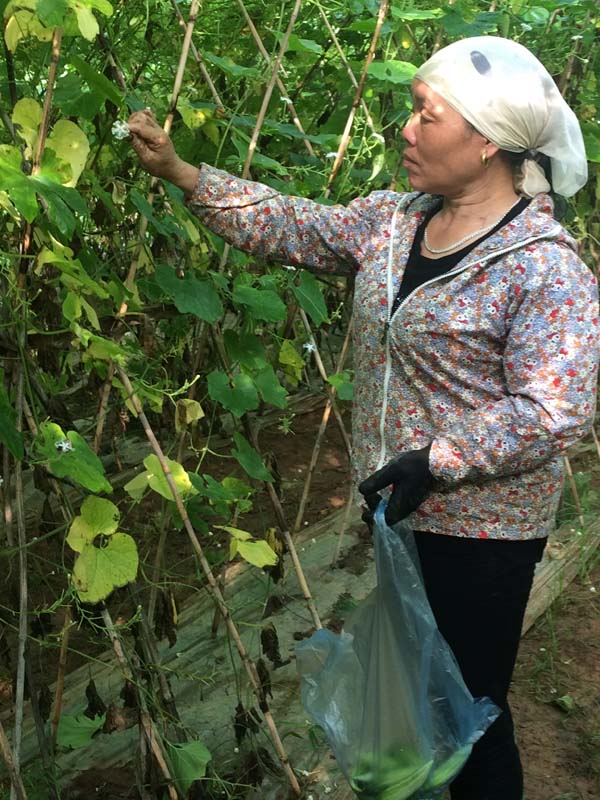
(HBO) – In recent years, farmers in Tong Dau commune in Mai Chau district have worked hard to switch to more suitable crops and animals, and to apply modern technologies in their farming practice for better output and productivity. Cardiopteris quinqueloba, a type of vine that gives small and tasty fruit, has gained significant attention from local authorities and residents. In the past, locals cultivated the vine for their daily meals. The fruit now has become popular and found its place in the market.
From over 2,000 square metres of cardiopteris
quinqueloba plantation, Vi Thi Cuong and her family in Cha Long hamlet, Tong
Dau commune, earn more than 200 million VND on an annual basis.
In 2017, Tong Dau planted nearly 2 hectares of cardiopteris quinqueloba. The
figure grew to 3 hectares one year later. Visiting Vi Thi Cuong’s garden of the
vine in Cha Long hamlet, we were amazed by its plantation and productivity.
Cuong’s family is cultivating cardiopteris quinqueloba on over 2,000 square
metres of land and earn an annual income of 250 million VND (10,700 USD).
The tasty fruit is in the market’s favour, bringing high
commercial values for the growers. Its retail prices range from 15,000 to 20,000
VND per kg, while the wholesale price is 15,000 VND per kg. Cha Long residents
said there are days when local households sold 2 – 3 tonnes of the fruit to
buyers from across the nation. Profit from the new business is between 2 and 3
times higher than that of rice and other vegetables.
Ha Van Doan, chairman of the Tong Dau farmers’ association, said:
"Cardiopteris quinqueloba is now a key plant in the hamlet. Ten years of
growing the vine have helped many families get rid of poverty and gain a better
life. The vince is easy to grow and suits the local soils and weather.
Requiring small investment and simple care, it has quickly drawn locals’
interest.”
The vine is often planted in March and can be harvested three
months later./.
Dao Village’s honey – a product certified with a 3-star OCOP (One Commune One Product) rating by Thong Nhat Agricultural Cooperative in Dao Village (Hoa Binh City) – is highly regarded by consumers for its quality, richness, and variety in packaging. The distinctively sweet taste of Dao Village’s honey leaves a lasting impression on anyone who has tried it.
In alignment with Project No. 07-DA/TU, issued by the Hoa Binh provincial Party Committee on November 1, 2021, Lac Thuy district has actively promoted investment and supported the sustainable development of its industrial and handicraft sectors during the 2021–2025 period. Alongside this, the district has remained committed to preserving and revitalising traditional craft villages.
Located in the northern part of Lac Thuy district, with a temperate climate and fertile soil, Phu Thanh commune has great potential and advantages in growing tea. The long-standing experience, combined with strict adherence to organic farming practices in the tea gardens, ensures that the dried tea products from Phu Thanh and Lac Thuy as a whole are sold out immediately upon production, providing a stable and prosperous life for the local people.
Amid efforts to streamline the administrative apparatus, Hoa Binh province has intensified measures to address challenges in land clearance, resettlement support, and infrastructure investment, aiming to speed up the progress of key projects.
Hoa Binh province has posted an unprecedented economic growth rate of 12.76% in the first quarter of 2025, marking its highest quarterly performance to date and positioning it as the second fastest-growing locality in the country, trailing only Bac Giang province.
Under current regulations, products in the One Commune – One Product (OCOP) programme that are rated three stars or higher must undergo re-evaluation every three months. However, in reality, some of these products fail to consistently meet the required standards, raising concerns about the sustainability of their OCOP certification. This underscores the urgent need for producers to enhance product quality and gradually develop their OCOP products into strong, marketable brands.



